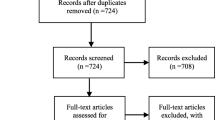Abstract
Objective
With the current emphasis on integrated care, the role of psychiatrists is expanding to either directly provide medical care or coordinate its delivery. The purpose of this study was to survey general psychiatry programs on the extent of general medicine training provided during residency.
Methods
A short web-based survey was sent to 173 residency program directors to recruit participants for a larger survey. Thirty-seven participants were recruited and surveyed, and of these, 12 (32.4 %) responded. The survey assessed the extent of general medicine training and didactics during and after the first postgraduate year and attitudes towards enhancing this training in residency. This study was approved by the local institutional review board.
Results
Seventy-five percent of programs require only the minimum 4 months of primary care in the first postgraduate year, and didactics during these months is often not relevant to psychiatry residents. Some programs offer elective didactics on chronic medical conditions in the fourth postgraduate year. Respondents are in favor of enhancing general medicine training in psychiatry but indicate some resistance from their institutions.
Conclusions
These results suggest that very few programs require additional clinical training in relevant medical illnesses after the first postgraduate year. Respondents indicated favorable institutional support for enhancing training, but also expected resistance. The reasons for resistance should be an area of future research. Also important is to determine if enhancing medical didactics improves patient care and outcomes. The changing role of psychiatrists entails a closer look at resident curricula.
Similar content being viewed by others
References
Colton CW, Manderscheid RW. Congruencies in increased mortality rates, years of potential life lost, and causes of death among public mental health clients in eight states. Prev Chronic Dis. 2006;3:A42.
Druss BG, Rosenheck RA. Locus of mental health treatment in an integrated health care setting. Psychiatr Serv. 2000;51:890–2.
Kick SD, Morrison M, Kathol RG. Medical training in psychiatry residency. A proposed curriculum. Gen Hosp Psychiatry. 1997;19(4):259–66.
Dobscha SK, Ganzini L. A program for teaching psychiatric residents to provide integrated psychiatric and primary medical care. Psychiatr Serv. 2001;52:1651–3.
Rohrbaugh RM, Felker B, Kosten T. The VA psychiatry-primary care education initiative. Acad Psychiatry. 2009;33(1):31–6.
Onate J, Hales R, McCarron R, Han J, Pitman D. A novel approach to medicine training for psychiatry residents. Acad Psychiatry. 2008;32(6):518–20.
Author information
Authors and Affiliations
Corresponding author
Additional information
Disclosure
The authors have no conflicts of interest.
Rights and permissions
About this article
Cite this article
Annamalai, A., Rohrbaugh, R.M. & Sernyak, M.J. Status of General Medicine Training and Education in Psychiatry Residency. Acad Psychiatry 38, 473–475 (2014). https://doi.org/10.1007/s40596-014-0106-y
Received:
Accepted:
Published:
Issue Date:
DOI: https://doi.org/10.1007/s40596-014-0106-y




